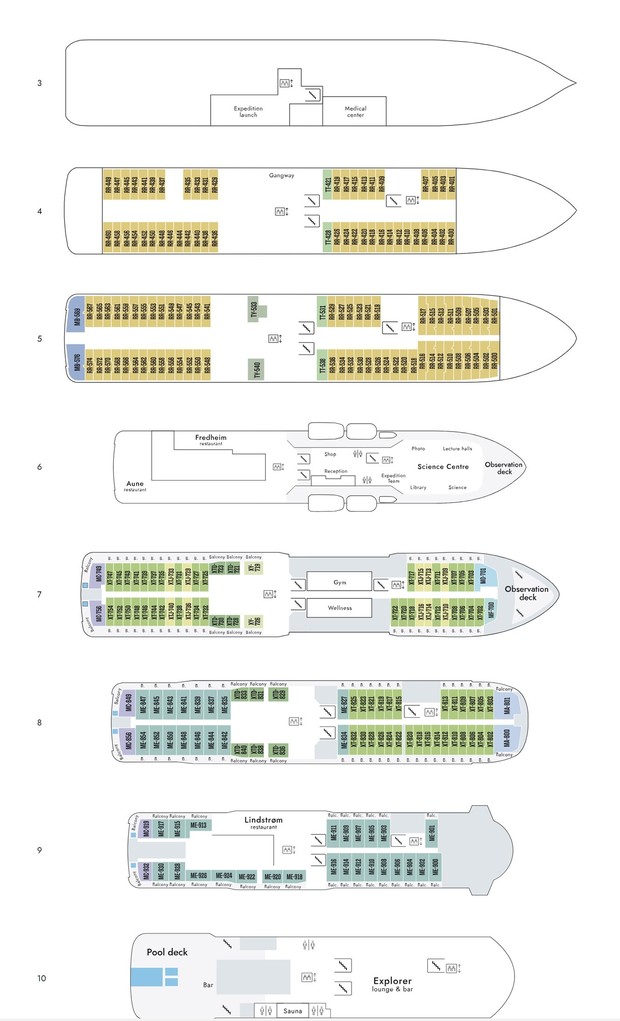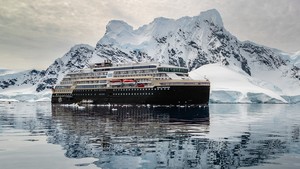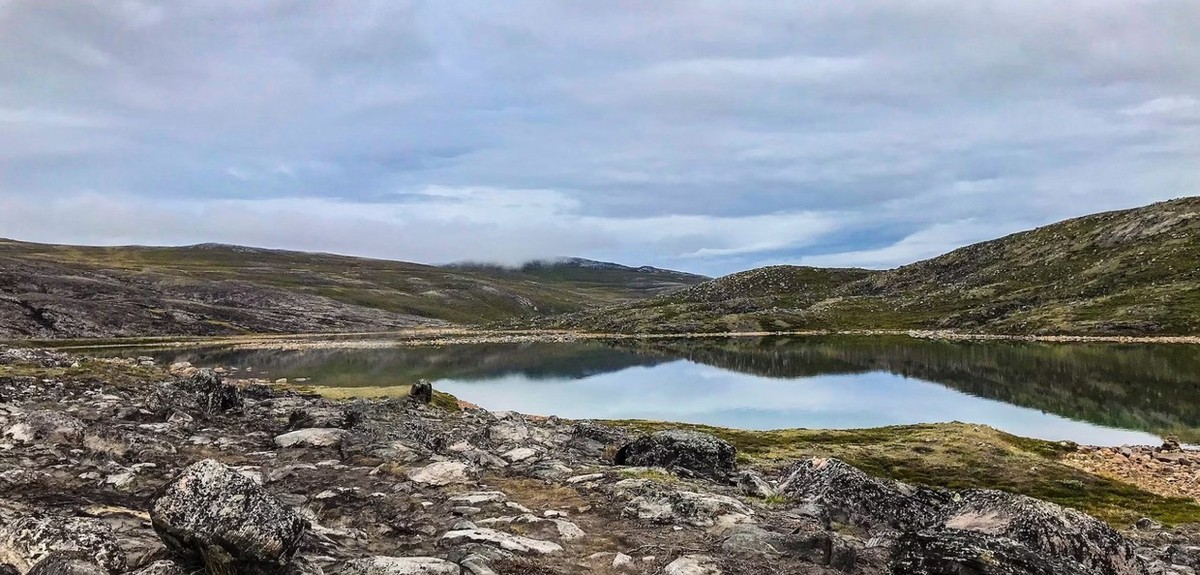
Wild nature and traditional communities
Sailing from Reykjavík, we cross the Denmark Strait and explore remote areas that few get to visit. There, you’ll discover Norse ruins, visit traditional communities, explore UNESCO-listed historical sites, and learn about the culture of the Arctic peoples.
Wildlife and ice sculpted landscapes
Witness the majestic landscapes of Greenland as we explore deep fjords cut into breathtaking mountain landscapes, cruise to cascading tidewater glaciers, delight in the otherworldly beauty of crystalline icebergs, and spot aquatic mammals along the way.
- Sail from Reykjavík to southwest Greenland and witness spectacular glaciers and icebergs as we probe deep into little-visited fjords.
- See awe-inspiring scenery and wildlife, visit colourful local communities, and delve into Norse history at ancient sites.
- With an onboard science focus, learn about the geology that shaped the world’s largest island, as well as its biodiversity and mineral deposits.
Prices quoted here are often dependent on currency fluctuations. Please check with (01432 507450 or info@small-cruise-ships.com) for the very latest price, which may well be cheaper than the one advertised here.
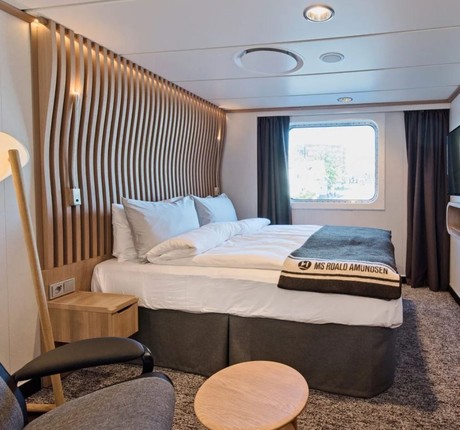
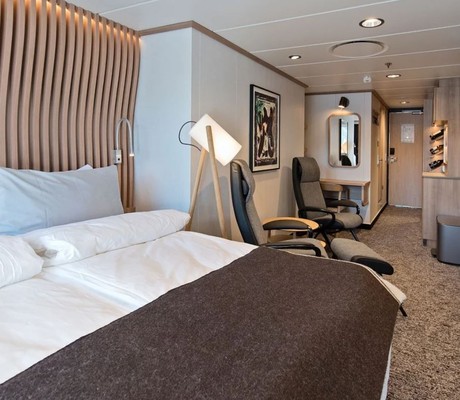
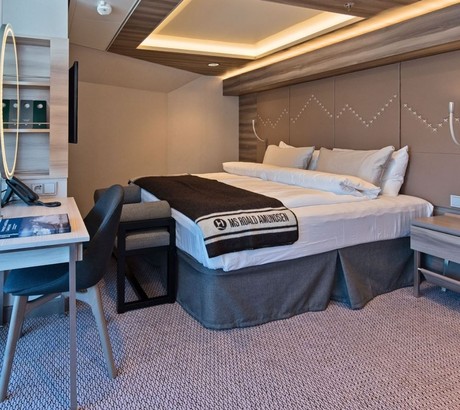
Prices quoted here are often dependent on currency fluctuations. Please check with (01432 507450 or info@small-cruise-ships.com) for the very latest price, which may well be cheaper than the one advertised here.



Explore the world’s northernmost capital
Your adventure begins in Reykjavík.
A laid-back city of art, culture and history, delightful Reykjavík is well worth spending some time getting to know.
Take a stroll along Laugavegur with its boutiques and outdoor shops, gaze in awe at the striking Hallgrímskirkja
Church, and drop in on the fascinating Reykjavík Art Museum.
If you have the time, we recommend booking a Pre-Programme with us and discovering some of Iceland’s natural highlights before your cruise begins.
In the wake of Vikings
We sail to Greenland across the Denmark Strait. This is the route taken by the Viking Erik the Red, who is credited as being the first European to have settled there. Sometimes we spot whales along the way, so keep a lookout.
During the two-day crossing, you’ll have plenty of time to get to know the ship and all its onboard facilities. At the same time the Expedition Team will give presentations about the protocols of respectfully visiting the fragile natural areas and Indigenous Arctic communities. Now is the time to book excursions and maybe learn a few words of Greenlandic.
Primarily, however, this is a time of adjustment and enjoyment. You’ll relish delicious meals in the onboard restaurants, listen to some amazing talks and simply get to relax and unwind on this comfortable ship. As we get closer to Greenland, or Kalaallit Nunaat as it is known you’ll feel the anticipation and excitement building … your adventure is about to begin!
Get straight into adventure mode
Over the next four days we’ll be going full-on expedition style as we explore the maze of fjords, channels and islands in this spectacular and wild region. Local weather and ice conditions will determine where and when we land, but the Captain and Expedition Team are used to these conditions and know the best places to go.
On our landings, excursions, and activities we’ll aim to visit Norse ruins, sail into majestic fjords where beautifully sculpted icebergs glisten in the sun, and go on community visits to picturesque towns. You might land at the colourful and tranquil settlement of Qaqortoq with its beautiful lake, drop by Erik the Red’s farm at Brattahlíð, and simply gaze in wonder at the spectacular mountainous landscapes of the scenic southern fjords.
As you’ll discover, southern Greenland’s rugged mountain ranges tower above scattered green meadows and fjords. It’s a landscape sculpted by ice and weather over billions of years. The Norsemen settled here over a thousand years ago, but the harsh living conditions eventually saw them leave after only four centuries. Now, in this vast and mostly unpopulated wilderness, you’ll enjoy a sense of tranquillity not often found in the modern world, so just relax, enjoy the nature, and learn all about what makes this region so special.
Fjords, glaciers, and ghostly mining towns
The stretch of coast between the fjord systems of southern Greenland and Nuuk is as wild as can be. Long distances separate the few scattered settlements. And although the climate is still mild by Arctic standards the topography is rough, segmented by high mountain ranges half covered by ice and cut through by deep turquoise fjords. With very few inside passages, travelling here has been a challenge since ancient times. And it still is. Mother Nature is in charge here, meaning it’s the perfect adventure playground for modern explorers.
On our way north, and always adapted to the local conditions, we’ll get to know the landscapes of the so-called Mellembygden – the Middle Settlement of the Norse settlers. We’ll also look for the ghostly mining town of Ivittuut, where the historically important mineral cryolite was mined, but where today the only inhabitants are shy musk oxen. And we’ll sail into great fjords carved out over millennia by massive glaciers cascading down from the icecap.
Wildlife thrives in this isolated region. Join our Expedition Team on their wildlife watches either on board or on land, and keep your camera and binoculars ready for seabirds, nesting colonies, and whales feeding at sea. If we’re lucky, we may even see one of the few musk ox herds living on the west Greenland coast.
Be on the lookout for wildlife and history
Get ready to explore a grand fjord system. Locally known as the Nuup Kangerlua, the fjords around Nuuk fan out in a somehow parallel network of interconnected waterways. They’re topped by the Kangiussap Nunaa peninsula and the ice cap, most notably in the so-called Nuuk Isfjord.
These are the lands of the ancient Norse Western Settlement, the northernmost area they managed to colonise in the Middle Ages. It was probably in Nuup Kangerlua where the descendants of the Vikings met the Thule people for the first time.
The fjords are dotted here and there by old Norse ruins and small Inuit settlements. Some are abandoned, like picturesque Qornoq, while others are thriving, such as Kapisillit and its 88 inhabitants. Relative proximity to Nuuk somehow disguises the fact that communities along Nuup Kangerlua were until very recently as isolated as any other in Greenland.
Weather and ice permitting, during the next two days we will explore the fjord system and enjoy the ever-changing mountain landscapes. We’ll also try to reach the icy headwaters of Nuup Kangerlua and visit one of the Inuit villages, while always looking for hiking, ice cruising and wildlife watching opportunities.
Get acquainted with a small capital in a grand setting
We say a fond farewell to the ship, crew and Expedition Team as we end our voyage of discovery in Nuuk. The lively and compact capital is positively bustling compared to other places you will have visited – but at less than 20,000 residents, it’s hardly a metropolis.
Visit the national museum to get an insight into life here 500 years ago and see the fascinating Qilakitsoq mummies. Otherwise, there are plentiful shopping opportunities – by Greenland standards – and a mix of cafes and restaurants to drop in on. If you have time before flying back home, Nuuk offers a fascinating window onto modern Greenland.
From here, you'll catch a flight back to Reykjavík, taking with you a wealth of fantastic memories that will no doubt stay with you forever.
See more of Reykjavík
Today you’ll wake up in Reykjavík, where your adventure concludes. However, this means you have another chance to explore Iceland's stylish capital, if time allows.
If you want to discover more, you can join our optional Post-Programme before heading home. Or simply extend your stay and enjoy Reykjavík and its surrounding geothermal attractions.
Itineraries are subject to change.
Fridtjof Nansen

| Max passengers: | 530 |
|---|
Fridtjof Nansen is a small cruise ship specifically designed to be one of the most sustainable ships that can visit the Polar regions.
Launched in 2020, The state of the art vessel features new and environmentally sustainable hybrid technology that will reduce fuel consumption and show the world that hybrid propulsion on large ships is possible.
MS Fridtjof Nansen is the second of two hybrid ships to be launched cutting emissions by sailing with electrical propulsion. Hybrid technology, combined with the advanced construction of the hull and effective use of electricity on board will reduce fuel consumption and CO2-emissions on the ships by 20 percent.
The future of shipping will be silent and emission free. MS Fridtjof Nansen will lead the way towards an even more sustainable way of traveling. Sailing on electrical power is not only a great benefit for the environment, but it will also enhance the impact of experiencing nature for the guests. The ship will be specially constructed for voyages in polar waters and serve as a comfortable basecamp at sea – bringing adventurers from all over the world to the most spectacular destinations in the most sustainable way.
These ships combine state-of-the-art technology together with a premium onboard experience. All cabins are outside, half have private balconies, and aft suites even boast private outdoor Jacuzzis, to soak up the stunning scenery in style.
Facilities on board
One of the most eye-catching exterior design features of the ships will be the two-level indoor/outdoor Observation Deck wrapped around the top of the ships’ raked bow. In a vast area behind it, you’ll find the core of the onboard experience: Amundsen Science Center.
Packed with state of the art technology and high tech gadgets such as touch screens and science equipment, the immersive edutainment area will be the place guests and staff/crew meet, mingle and create a deeper understanding for the areas they explore. The flexible venue will feature lecture spaces, a small library, and speciality areas for workshops in photography, biology, and more.
The stunning scenery will be reflected in a rich and comfortable interior design. Scandinavian materials from nature, such as granite, oak, birch and wool will be used to create relaxed and stylish cabins and public areas. All cabins are outside, 50 % will have private balconies, aft suites will feature private outdoor Jacuzzis with spectacular views.
